By Leen Randell
Updated: Jul 03, 2024
10 Best Herbal Teas For Eye Swelling
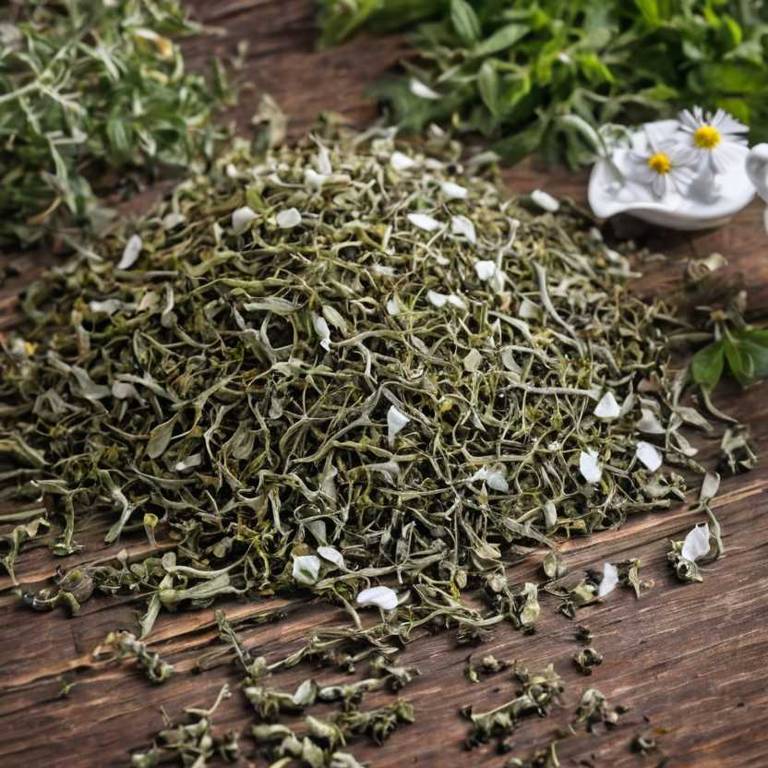
Herbal teas for eye swelling are a natural remedy that helps to reduce inflammation and alleviate discomfort.
These teas contain anti-inflammatory properties that help to constrict blood vessels and reduce swelling. Examples of herbal teas that help with eye swelling include peppermint, chamomile, and calendula.
Drinking these teas can provide relief from puffy eyes, allowing individuals to look and feel better, and improving their overall quality of life and confidence.
The following article describes in detail the most important teas for eye swelling, including medicinal properties, parts of herbs to use, and recipes for preparations.
- 1. Aloe vera
- 2. Ginkgo biloba
- 3. Echinacea purpurea
- 4. Taraxacum officinale
- 5. Hypericum perforatum
- 6. Matricaria chamomilla
- 7. Calendula officinalis
- 8. Euphrasia officinalis
- 9. Symphytum officinale
- 10. Plantago major
- What is the best combination of herbal teas to use for eye swelling?
- What ailments similar to eye swelling are treated with herbal teas?
1. Aloe vera
Aloe vera, also known as aloe, teas helps with eye swelling because of its anti-inflammatory properties.
The tea's active compounds, such as aloin and aloe-emodin, are absorbed into the bloodstream and reduce swelling and inflammation around the eyes. Additionally, aloe vera's natural soothing and moisturizing properties help to calm and hydrate the delicate skin around the eyes, making it an effective remedy for eye swelling.
This natural remedy can provide quick relief from puffy and swollen eyes.
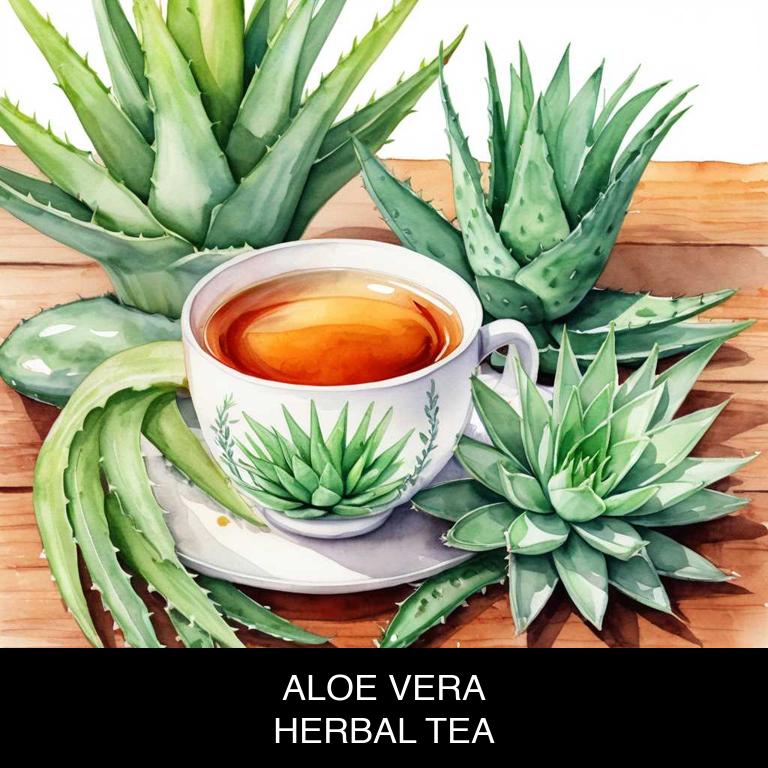
Medicinal Constituents
The list below shows the primary medicinal constituents in Aloe vera teas that help with eye swelling.
- Anthraquinones: These glycosides help reduce inflammation and swelling by inhibiting the production of pro-inflammatory enzymes and cytokines, thereby alleviating eye puffiness.
- Aloin: This anthraquinone glycoside has anti-inflammatory and antioxidant properties, which help to reduce swelling and soothe the tissues around the eyes, thereby providing relief from eye swelling.
- Phenolic acids: These compounds possess potent antioxidant and anti-inflammatory properties, which help to reduce oxidative stress and inflammation in the eye area, thereby alleviating eye swelling and puffiness.
Parts Used
The list below shows the primary parts of aloe used to make teas for eye swelling.
- Leaves: The gel from Aloe vera leaves is most commonly used to make teas, as it contains anti-inflammatory properties that help reduce swelling.
- Stems: The pulp from Aloe vera stems is also used to make teas, as it contains compounds that help reduce inflammation and ease eye puffiness.
Quick Recipe
The following recipe gives a procedure to make a basic aloe for eye swelling.
- Cut 2-3 inches of fresh aloe vera leaves into small pieces to release their juices.
- Blend 1 tablespoon of aloe vera pieces with 1 cup of boiling water in a blender.
- Strain the mixture through a cheesecloth or a fine-mesh sieve to remove solids.
- Steep 1 teaspoon of dried aloe vera powder in 1 cup of boiling water for 5 minutes.
- Chill the tea in the refrigerator for at least 30 minutes before serving.
2. Ginkgo biloba
Ginkgo biloba, also known as maidenhair tree, teas helps with eye swelling because it has potent anti-inflammatory properties that reduce swelling and promote healing.
The flavonoids and terpenoids present in Ginkgo biloba extract help to improve blood circulation and reduce oxidative stress, which can contribute to eye swelling. Additionally, Ginkgo biloba teas can help to relax the blood vessels and reduce pressure on the eyes, providing quick relief from puffiness and discomfort.
This makes it a popular natural remedy for eye swelling.

Medicinal Constituents
The list below shows the primary medicinal constituents in Ginkgo biloba teas that help with eye swelling.
- Flavonoids: These polyphenolic compounds help reduce inflammation and swelling by inhibiting the production of pro-inflammatory enzymes, thereby alleviating eye swelling.
- Bilobalide: As a sesquiterpene trilactone, bilobalide has anti-inflammatory and antioxidant properties that help reduce swelling and oxidative stress in the eyes, promoting comfort and relief.
- Quercetin: A type of flavonoid, quercetin is known for its potent anti-inflammatory and antioxidant effects, which may help reduce swelling, redness, and discomfort associated with eye inflammation.
Parts Used
The list below shows the primary parts of maidenhair tree used to make teas for eye swelling.
- Leaves: Used to make teas for eye swelling due to their anti-inflammatory properties, which help reduce swelling and inflammation in the eyes.
- Seeds: Used to make teas for eye swelling due to their antioxidant and anti-inflammatory compounds, which help soothe and calm the eyes.
- Barks: Used to make teas for eye swelling due to their anti-inflammatory and antioxidant properties, which help reduce swelling and promote healing in the eyes.
- Leaves: Used to make teas for eye swelling due to their anti-inflammatory properties, which help reduce swelling and inflammation in the eyes.
- Barks: Used to make teas for eye swelling due to their anti-inflammatory and antioxidant properties, which help reduce swelling and promote healing in the eyes.
- Fruits: Used to make teas for eye swelling due to their antioxidant properties, which help soothe and calm the eyes.
Quick Recipe
The following recipe gives a procedure to make a basic maidenhair tree for eye swelling.
- Gather 2 teaspoons of dried ginkgo biloba leaves, 1 cup of boiling water and a tea infuser.
- Steep the ginkgo biloba leaves in the boiling water for 5-7 minutes to release the active compounds.
- Strain the tea through the infuser and discard the solids to create a clear liquid.
- Add honey or lemon to taste and adjust the sweetness or flavor of the tea as desired.
- Drink the tea immediately and enjoy the potential health benefits of ginkgo biloba within 30 minutes.
3. Echinacea purpurea
Echinacea purpurea, also known as purple coneflower, teas helps with eye swelling because of its anti-inflammatory properties.
The tea's active compounds, such as alkylamides and caffeic acid, work to reduce inflammation and soothe irritated tissues. This natural remedy has been used for centuries to alleviate swelling and redness associated with eye conditions, including conjunctivitis and sinus infections.
By promoting a balanced immune response and reducing inflammation, Echinacea purpurea tea provides relief from eye swelling and promotes overall eye health.

Medicinal Constituents
The list below shows the primary medicinal constituents in Echinacea purpurea teas that help with eye swelling.
- Icariin: Icariin helps with eye swelling by reducing inflammation and modulating the immune response, which can contribute to swelling.
- Cichoric acid: Cichoric acid has anti-inflammatory properties that can help reduce swelling and alleviate eye irritation.
- Alkylamides: Alkylamides have anti-inflammatory and immunomodulatory effects, which can help reduce eye swelling by inhibiting the production of pro-inflammatory cytokines.
Parts Used
The list below shows the primary parts of purple coneflower used to make teas for eye swelling.
- Roots: The roots of Echinacea purpurea are commonly used in teas due to their high concentration of alkaloids, which have anti-inflammatory properties that help alleviate eye swelling.
- Flowers: The flowers are used in teas because of their high content of flavonoids and phenolic compounds, which have anti-inflammatory and antioxidant effects that help reduce eye swelling.
- Leaves: The leaves are used in teas for their rich content of phenolic compounds, which exhibit anti-inflammatory properties that help alleviate eye swelling.
Quick Recipe
The following recipe gives a procedure to make a basic purple coneflower for eye swelling.
- Gather 2-3 tablespoons of dried echinacea purpurea flowers and 1 teaspoon of dried roots.
- Steep the flowers and roots in 8 ounces of boiling water for 5-7 minutes.
- Strain the mixture through a fine-mesh sieve into a cup to remove the solids.
- Add honey or lemon to taste if desired to enhance the flavor and aroma.
- Drink the tea immediately and enjoy its potential health benefits within 30 minutes to 1 hour.
4. Taraxacum officinale
Taraxacum officinale, also known as dandelion, teas helps with eye swelling because of its anti-inflammatory properties.
The flavonoids and terpenoids present in the plant have been shown to reduce swelling and promote healthy blood flow to the eyes. The diuretic properties of dandelion also help to reduce fluid retention, which can contribute to eye puffiness.
Additionally, the antioxidants in the tea may help to protect the delicate tissues of the eyes from oxidative stress, further reducing swelling and promoting overall eye health.

Medicinal Constituents
The list below shows the primary medicinal constituents in Taraxacum officinale teas that help with eye swelling.
- Taraxasterol: This triterpenoid saponin has anti-inflammatory properties, which help reduce swelling in the eyes by inhibiting the production of pro-inflammatory mediators.
- Quercetin: This flavonoid phenolic compound has strong antioxidant and anti-inflammatory effects, which help alleviate eye swelling by scavenging free radicals and reducing oxidative stress.
- Luteolin: This flavone phenolic compound has potent anti-inflammatory and antioxidant properties, which help reduce eye swelling by inhibiting the activity of inflammatory enzymes and reducing tissue damage.
Parts Used
The list below shows the primary parts of dandelion used to make teas for eye swelling.
- Leaves: Known for their anti-inflammatory properties, Taraxacum officinale leaves help reduce swelling and soothe irritated eyes.
- Flowers: Rich in antioxidants and flavonoids, the flowers of Taraxacum officinale can help calm and reduce inflammation around the eyes.
- Roots: Containing a compound called taraxasterol, the roots of Taraxacum officinale may help alleviate eye swelling and promote relaxation.
Quick Recipe
The following recipe gives a procedure to make a basic dandelion for eye swelling.
- Gather 20-30 fresh or dried dandelion leaves and flowers in a clean container for storage.
- Dry the dandelion leaves and flowers in a single layer at 150-200 degrees fahrenheit for 30 minutes.
- Weigh out 2 teaspoons of dried dandelion leaves and flowers for a single serving.
- Steep the dried dandelion leaves and flowers in 8 ounces of boiling water for 5-10 minutes.
- Strain the tea and discard the solids to serve the dandelion tea immediately.
5. Hypericum perforatum
Hypericum perforatum, also known as St John's Wort, teas helps with eye swelling because of its anti-inflammatory properties.
The flavonoids and phenolic acids present in the herb have been shown to reduce swelling and inflammation in the body. The tea's ability to relax blood vessels and improve circulation may also contribute to its effectiveness in reducing eye swelling.
Additionally, St John's Wort has been traditionally used to treat various eye issues, making it a popular natural remedy for eye health.

Medicinal Constituents
The list below shows the primary medicinal constituents in Hypericum perforatum teas that help with eye swelling.
- Hyperforin: Hyperforin has potent anti-inflammatory properties, which help reduce swelling and inflammation in the eyes by inhibiting the production of pro-inflammatory enzymes.
- Quercetin: Quercetin is a flavonoid with strong antioxidant and anti-inflammatory effects, which help alleviate eye swelling by scavenging free radicals and reducing inflammation in the ocular tissues.
- N-acetyl-serotonin: NAS has anti-inflammatory and vasoconstrictive properties, which help decrease eye swelling by reducing blood flow to the affected area and alleviating inflammation.
Parts Used
The list below shows the primary parts of st john's wort used to make teas for eye swelling.
- Leaves: Rich in flavonoids and tannins, which are believed to have anti-inflammatory properties that help reduce eye swelling.
- Flowers: Contain hypericin and hyperforin, which have potent anti-inflammatory and antioxidant effects that may help alleviate eye swelling.
- Roots: Also contain flavonoids and tannins, which are thought to contribute to their anti-inflammatory properties and help reduce eye swelling.
Quick Recipe
The following recipe gives a procedure to make a basic st john's wort for eye swelling.
- Harvest 1-2 pounds of fresh hypericum perforatum flowers in full bloom and clean them thoroughly.
- Dry the flowers in a single layer at 105-115 degrees fahrenheit for 2-3 hours.
- Use a digital scale to measure 1 teaspoon of dried flowers per 8 oz of boiling water.
- Steep the mixture for 5-7 minutes then strain it using a fine-mesh sieve or cheesecloth.
- Store the tea in airtight containers in the refrigerator for up to 3 days or freeze for later use.
6. Matricaria chamomilla
Matricaria chamomilla, also known as chamomile, teas helps with eye swelling because of its potent anti-inflammatory and antioxidant properties.
The tea's flavonoids and terpenoids work together to soothe and calm the skin around the eyes, reducing redness and puffiness. Chamomile tea's cooling effect helps to constrict blood vessels and reduce fluid accumulation, providing quick relief from eye swelling caused by allergies, sinus infections, or other irritations.
Its natural and gentle approach makes it a popular remedy for eye care.
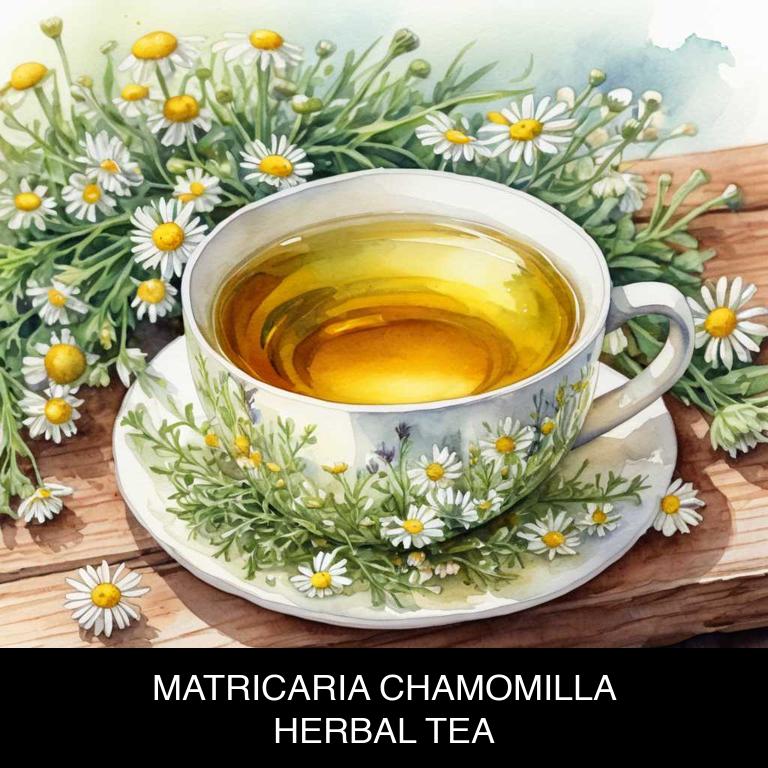
Medicinal Constituents
The list below shows the primary medicinal constituents in Matricaria chamomilla teas that help with eye swelling.
- Apigenin: As a flavonoid, apigenin helps reduce inflammation and relieve swelling associated with eye conditions by acting as an anti-inflammatory agent.
- Α-bisabolol: This sesquiterpene lactone has anti-inflammatory and soothing properties that help calm eye swelling and promote relaxation, thus reducing the discomfort associated with eye inflammation.
- Chamazulene: This sesquiterpene derivative exhibits anti-inflammatory and antioxidant properties, which help reduce eye swelling by inhibiting the production of pro-inflammatory mediators and promoting tissue repair.
Parts Used
The list below shows the primary parts of chamomile used to make teas for eye swelling.
- Flowers: They are used due to their anti-inflammatory properties and soothing effects on the skin.
- Leaves: They are used because they contain flavonoids and other compounds that help reduce swelling and calm the skin.
- Seeds: They are used due to their potential anti-inflammatory and antioxidant properties, which may help alleviate eye swelling.
Quick Recipe
The following recipe gives a procedure to make a basic chamomile for eye swelling.
- Harvest 1/2 cup of fresh matricaria chamomilla flowers or 1 tablespoon of dried flowers on a sunny day.
- Dry the harvested flowers in a cool dark place for 1 to 2 weeks to preserve their potency.
- Combine 1 teaspoon of dried flowers or 2 teaspoons of fresh flowers with 1 cup of boiling water in a teapot.
- Steep the mixture for 5 to 7 minutes to allow the flowers to release their active compounds.
- Strain the tea and serve it hot or chilled depending on your desired temperature and flavor profile.
7. Calendula officinalis
Calendula officinalis, also known as pot marigold, teas helps with eye swelling because of its anti-inflammatory properties.
The bioactive compounds present in calendula, such as triterpenoids and flavonoids, work to reduce inflammation and promote healing in the affected area. This herbal remedy has been used for centuries to soothe and calm irritated eyes, providing quick relief from swelling and redness.
The natural properties of calendula make it a popular choice for treating eye conditions and promoting overall eye health.

Medicinal Constituents
The list below shows the primary medicinal constituents in Calendula officinalis teas that help with eye swelling.
- Quercetin: A flavonoid phenolic compound that helps reduce inflammation and alleviate eye swelling by inhibiting the production of pro-inflammatory enzymes and mediators.
- Caffeic acid: A phenolic acid that exhibits anti-inflammatory and antioxidant properties, helping to reduce eye swelling by scavenging free radicals and reducing inflammation in the affected area.
- Neryl acetate: A sesquiterpene compound with anti-inflammatory and analgesic properties, which may help alleviate eye swelling by reducing pain and inflammation in the affected area.
Parts Used
The list below shows the primary parts of pot marigold used to make teas for eye swelling.
- Flowers: The flowers are the most commonly used part due to their high concentration of anti-inflammatory compounds like triterpenoids and flavonoids, which help reduce swelling and inflammation.
- Leaves: The leaves are another widely used part for their similar properties to the flowers, as they also contain anti-inflammatory compounds that can help alleviate eye swelling.
- Buds: The buds are often used due to their high concentration of calendulin, a compound with anti-inflammatory and soothing properties that can help reduce eye swelling and promote healing.
Quick Recipe
The following recipe gives a procedure to make a basic pot marigold for eye swelling.
- Harvest dried calendula flowers at a rate of 1 teaspoon for every 8 oz of water.
- Steep the dried flowers in boiling water for 5 to 7 minutes to release their properties.
- Strain the tea mixture through a fine mesh sieve into a separate container to remove solids.
- Store the herbal tea in an airtight container in the refrigerator for up to 24 hours.
- Serve the tea chilled or at room temperature depending on personal preference and taste.
8. Euphrasia officinalis
Euphrasia officinalis, also known as eyebright, teas helps with eye swelling because of its anti-inflammatory and antioxidant properties.
The herbs' flavonoids and phenolic acids help to reduce inflammation and alleviate puffiness in the eyes. Additionally, eyebright contains tannins, which have a soothing effect on the skin and mucous membranes. By reducing inflammation and promoting relaxation, Euphrasia officinalis teas can provide quick relief from eye swelling and promote overall eye health.
This natural remedy can be a effective solution for a range of eye-related issues.
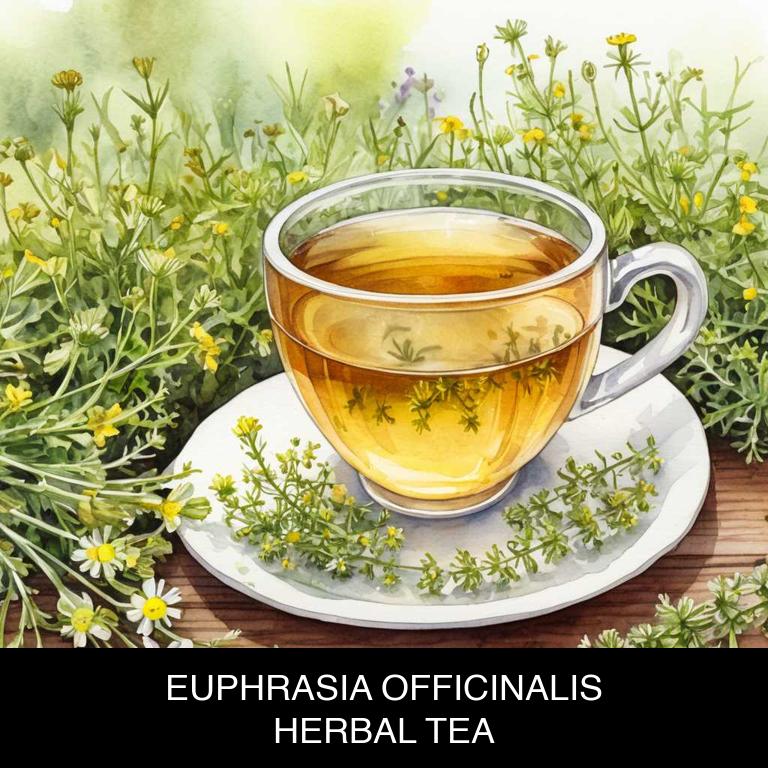
Medicinal Constituents
The list below shows the primary medicinal constituents in Euphrasia officinalis teas that help with eye swelling.
- Iridoid glycosides: These compounds have anti-inflammatory properties, which help to reduce swelling and ease eye irritation.
- Phenolic acids: They possess antioxidant and anti-inflammatory properties, which help to protect the eyes from oxidative stress and inflammation, thereby reducing swelling.
- Oleanolic acid: This triterpenoid compound exhibits anti-inflammatory and immunomodulatory effects, which can help to reduce eye swelling and promote healing.
Parts Used
The list below shows the primary parts of eyebright used to make teas for eye swelling.
- Leaves: They are the primary source of bioactive compounds, including flavonoids, phenolic acids, and iridoids, which are responsible for the medicinal properties.
- Flowers: They contain essential oils and other compounds that help reduce inflammation and alleviate eye swelling.
- Stems: The stems also contain bioactive compounds, such as flavonoids and phenolic acids, which contribute to the medicinal properties and anti-inflammatory effects of the tea.
Quick Recipe
The following recipe gives a procedure to make a basic eyebright for eye swelling.
- Gather 20-30 grams of dried euphrasia officinalis flowers and leaves to ensure sufficient herbal content.
- Measure 1 teaspoon of the gathered herb for every 8 ounces of boiling water required.
- Steep the measured euphrasia officinalis in the boiling water for 5-7 minutes to release its active properties.
- Strain the infused liquid through a fine-mesh sieve or cheesecloth to remove the remaining plant material.
- Allow the strained tea to cool for 5-10 minutes before serving to enhance its flavor and aroma.
9. Symphytum officinale
Symphytum officinale, also known as comfrey, teas helps with eye swelling because of its anti-inflammatory properties, specifically its ability to reduce swelling and promote healing.
The tea contains compounds such as allantoin, which is known to soothe and calm irritated tissues. Additionally, comfrey's mucilaginous properties help to reduce puffiness and alleviate discomfort. These properties make comfrey tea a natural remedy for relieving eye swelling, often associated with allergies, sinus issues, or minor eye injuries.
Its soothing effects can provide quick relief and comfort to the affected area.
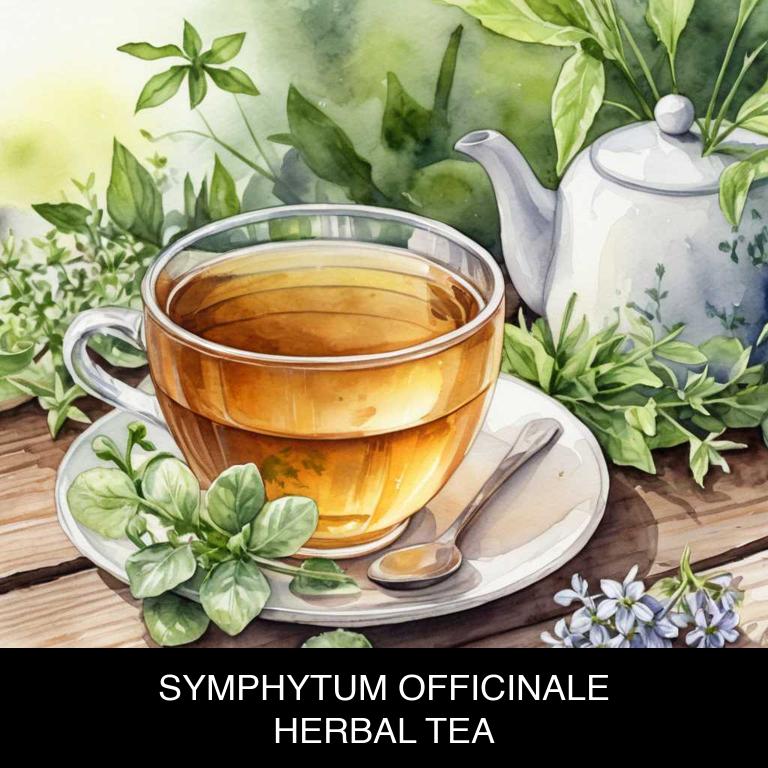
Medicinal Constituents
The list below shows the primary medicinal constituents in Symphytum officinale teas that help with eye swelling.
- Allantoin: Allantoin is a naturally occurring compound that helps to reduce inflammation and swelling by promoting the breakdown of excess fluid and debris in the eyes.
- Aesculin: Aesculin is a phenolic compound that has anti-inflammatory properties, which can help to reduce swelling and redness in the eyes by inhibiting the production of pro-inflammatory mediators.
- Saponins: Saponins are a type of terpene that have anti-inflammatory and antioxidant properties, which can help to reduce swelling and protect the eyes from oxidative damage caused by inflammation.
Parts Used
The list below shows the primary parts of comfrey used to make teas for eye swelling.
- Leaves: They are the most commonly used part due to their high concentration of mucilage, which helps reduce inflammation and swelling.
- Roots: The roots are also widely used for their anti-inflammatory properties, which help to soothe and calm irritated tissues.
- Stems: The stems are another popular choice due to their ability to provide a gentle, anti-inflammatory effect that helps alleviate eye swelling.
Quick Recipe
The following recipe gives a procedure to make a basic comfrey for eye swelling.
- Harvest 10-20 grams of fresh or 30-60 grams of dried symphytum officinale leaves and flowers.
- Rinse the herbs under cold running water for 10-15 seconds to remove impurities.
- Steep 1 teaspoon of dried herbs or 2 teaspoons of fresh herbs in 250 ml boiling water for 5-7 minutes.
- Strain the tea immediately using a fine-mesh sieve or cheesecloth into a cup or teapot.
- Allow the tea to cool to a comfortable temperature before serving.
10. Plantago major
Plantago major, also known as plantain, teas helps with eye swelling because of its anti-inflammatory properties.
The tea is rich in flavonoids, which have antioxidant and anti-inflammatory effects that can reduce swelling and inflammation in the eyes. Plantain also contains mucilages, which have soothing and calming effects that can help to reduce puffiness and redness. Additionally, the tea's ability to reduce fluid retention and improve circulation can also contribute to its effectiveness in relieving eye swelling.
This makes it a popular natural remedy for eye swelling.
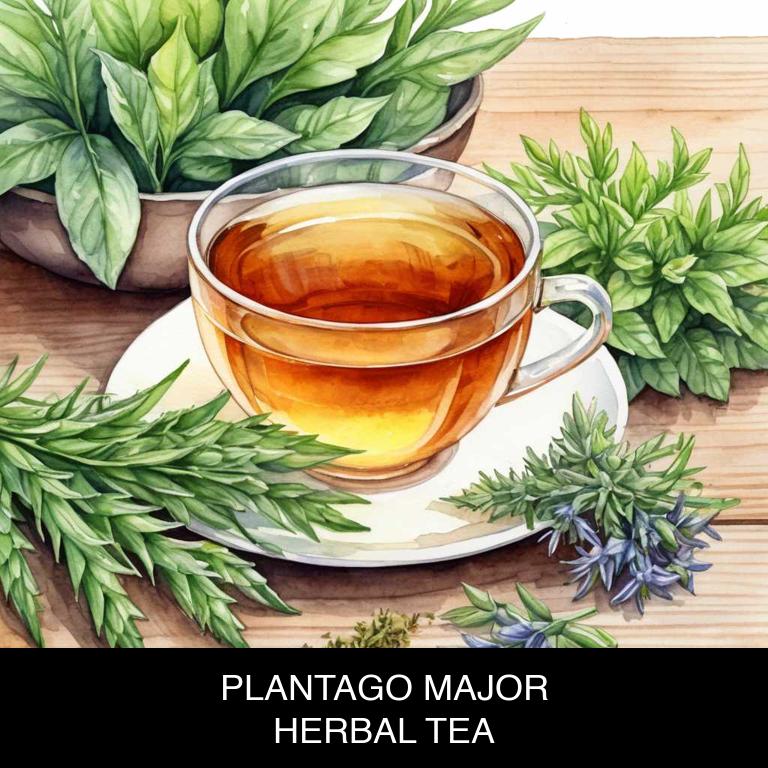
Medicinal Constituents
The list below shows the primary medicinal constituents in Plantago major teas that help with eye swelling.
- Apolypodin: A phenolic compound found in Plantago major, apolypodin helps with eye swelling by exhibiting anti-inflammatory properties, which reduce swelling and soothe irritated tissues.
- Apolypodinin: A flavonoid glycoside in Plantago major, apolypodinin helps alleviate eye swelling by possessing anti-inflammatory and antioxidant activities, which combat oxidative stress and inflammation in the affected area.
- Plantaginin: A phenolic glycoside in Plantago major, plantaginin helps with eye swelling by exhibiting strong anti-inflammatory and antioxidant properties, which reduce inflammation and promote tissue repair in the affected area.
Parts Used
The list below shows the primary parts of plantain used to make teas for eye swelling.
- Leaves: The leaves are the most commonly used part for making teas due to their high concentration of anti-inflammatory compounds that help reduce eye swelling.
- Stems: The stems of Plantago major are also used to make teas, as they contain flavonoids and other compounds that aid in reducing inflammation and swelling around the eyes.
- Barks: The barks of the plant are sometimes used to make teas for treating eye swelling, due to their content of alkaloids and other compounds with anti-inflammatory properties.
Quick Recipe
The following recipe gives a procedure to make a basic plantain for eye swelling.
- Harvest 25-50 grams of dried plantago major leaves and stems from a clean and pesticide-free source.
- Dry the harvested plantago major leaves in a low-temperature oven at 150-200 degrees fahrenheit for 2 hours.
- Grind 2-3 teaspoons of dried plantago major leaves into a fine powder using a coffee grinder.
- Steep 1 teaspoon of the ground plantago major powder in 250 milliliters of boiling water for 5-7 minutes.
- Strain the plantago major tea using a fine-mesh sieve and discard the solids to serve.
What is the best combination of herbal teas to use for eye swelling?
The best combination of herbal teas that help with eye swelling is a blend of chamomile, peppermint, and calendula.
Chamomile's anti-inflammatory properties help reduce swelling, while peppermint's cooling effect alleviates pain and discomfort. Calendula's antiseptic and anti-inflammatory properties promote healing and soothe the affected area. Steep a tea bag of each herb in hot water, let it cool, and apply it to the eye area for a few minutes to experience the benefits.
This combination helps to reduce swelling, ease pain, and promote a speedy recovery.
What ailments similar to eye swelling are treated with herbal teas?
Ailments similar to eye swelling that are treated with herbal teas are those related to inflammation, redness, and itchiness.
These include conditions such as conjunctivitis, pink eye, and sties, which can be alleviated by the antibacterial and anti-inflammatory properties of herbal teas like peppermint, chamomile, and calendula.
Additionally, tea tree oil-infused teas may help soothe skin irritations like acne, rosacea, and eczema.